BrainDead: A Show that Had Something Unusual to Say about American Politics
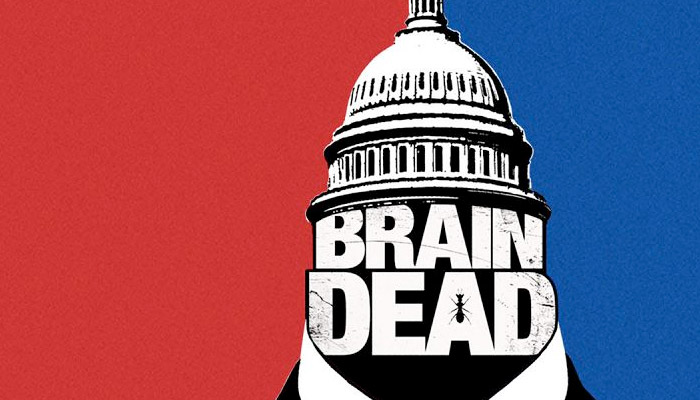
BrainDead, a 2016 summer replacement TV show on CBS (now on Paramount+, starring Mary Elizabeth Winstead, Tony Shalhoub, Danny Pino, and Aaron Tveit) was based on the premise that alien bugs (well, ants) arrived on Earth by a comet that struck somewhere in Russia, ended up in Washington, D.C., and then the ants ate parts of the brains of (primarily) politicians as a result they become more aggressive and less willing to talk to each other. Political polarization, the notion that politicians, political parties, and even the broader public take more extreme positions on issues can be seen through episodes of this show. Extreme positions can be malignant to a democracy since they are not just about opposing views on policy positions but also about attitudes toward the opposition. From this emerges a belief in “us versus them,” which makes it difficult to resolve any significant issue.
BrainDead has a unique take on why dysfunctional is a way to describe the political climate in our nation’s capital. Interestingly, the show ended its run on CBS two months before Donald Trump was elected President. In other words, this show portrayed a political climate in Washington which predated Trump as President but displayed all the impact his Presidency had on politics and continues to have. And you thought all you had to do was watch political pundits pontificate about what goes on in Washington and what they see as the problem.

The dialogue in BrainDead is often biting and insightful and provides the means to more broadly address politics. Television viewing is usually seen as a passive activity, but this show can benefit viewers if they use various scenes as a mean to learn more about actual political activity.
The type of political satire that BrainDead is based on, requires some interaction where the audience does not simply remain passive about watching the show and leaves it at that, but uses the show to enhance and improve their knowledge of politics. Using the show as a jumping off point where viewers go out and learn for themselves might be expecting too much from television viewers, but it is a way to get the most out of an inventive television show.
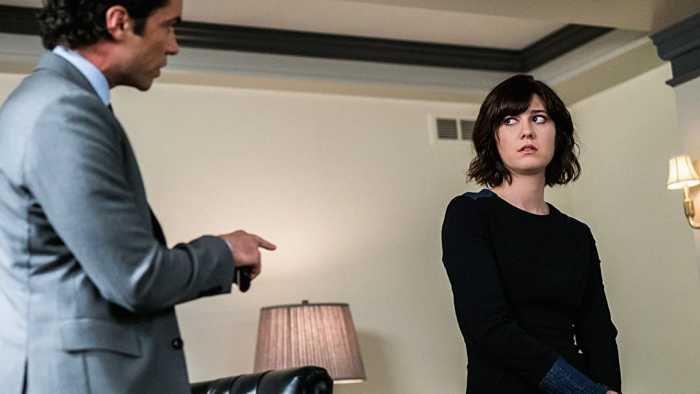
Political satire can be difficult to convey well to a television audience. Robert King, who, along with his wife Michelle created BrainDead (they are best known for creating The Good Wife and The Good Fight) stated, regarding the show after it was cancelled, “Avoid satire. It was a show that was trying to be as weird and anti-network as could be, and it was probably a mistake to do that on a network. But I loved that show.” 1 The explanation that King gave for the show’s cancellation is only partially correct. Television has political satire, which can be seen with The Daily Show that began in 1996 with Jon Stewart and now has Trevor Noah as its host. In addition, Stephen Colbert hosted The Colbert Report from 2005-2014 and then became the host of The Late Show. CBS would not have chosen Colbert to replace David Letterman in 2015 if political satire did not reach a wide audience. BrainDead was a different type of political satire than what has become a regular part of television.
Colbert is a good example of political satirist affected by political polarization, which is the driving force that led the King’s to create BrainDead. When Colbert did The Colbert Report, he was “in character” as a pompous, opinionated, conservative commentator. In fact, one study noted that a number of conservatives believed he was making fun of liberals. 2 A Washington Post article, asked the question, “What are Stephen Colbert’s politics?” when it was announced he would replace David Letterman on The Late Show. 3 Nina Tassler, CBS Entertainment Chair said, regarding Colbert, “We didn’t have concerns [regarding his liberalism]. We were most excited about his talent to be creative and innovative, and now he’s going to work on his idea of what his show will look like.” 4 A New York Times article stated regarding Colbert, “he has never openly endorsed Democrats or liberal positions.” 5
It was the election of Donald Trump as President that started the process of how Colbert and, for that matter, other late night hosts are now clearly seen as overtly anti-Trump or anti-Trumpism (something that has become part of politics without Trump as President which has been labeled by one reporter as “grievance-oriented politics”) 6: The us versus them attitude of political polarization has clearly emerged on late night shows. In 2015, Jeb Bush, at that time one of the Republicans vying for the Republican nomination to run for President in 2016, was on The Late Show and Colbert, essentially, lobbed him softball questions: Bush acted like he was on the campaign trail rather than on a show where he should have joked which did not help him. 7 The exchange at least reflected Colbert as willing to interact with both Democrats and Republicans, with no clear stance against one political side. Trump with his hostility, lies, and lack of civility, however, brought changes to late night political satire. One writer put it:
It’s been difficult for late-night hosts to get a handle on Trump—Colbert himself seemed to flounder in an interview with [Trump] near the start of his tenure on The Late Show. Trump’s inflated ridiculousness is tough to penetrate with ordinary satire: Pointing to his personal foibles and liberty with the truth is about as funny as pointing out that the sky is blue. 8
Political satire, the type that addresses the news of the day and then responds to it, has developed in a way for many to grapple with the residuals that are now Trumpism, where elevated hostility levels and outright political lies are now seen as routine, even with Trump no longer in the White House.
BrainDead is an entirely different type of political satire that can be the starting point to be used by viewers as a way to obtain a political education where the intricacies and nuances of politics can be seen, understood, and appreciated. Frontline on PBS, as a particular episode ends, refers viewers to a website where they can go to learn more about what they just watched. There is nothing like this for BrainDead and so viewers are on their own to learn more about politics. This interaction where a television show can lead to learning more is not necessarily an easy thing to do but it is something that viewers should be encouraged to do. The dialogue and the various scenes provide a means to take one’s understanding of politics beyond what is normally gained from watching television news. Considering that misinformation and the widespread belief in conspiracies have risen to levels that might have been difficult to imagine just five years ago, makes learning about politics a necessary tool to navigate the political environment. 9
Politics as Problem-Solving is Indispensable With or Without Ants, Although Politics as Theater Gets the Attention
Politics as Kafkaesque, extremely odd with overtones of the ludicrous, is one way to understand politics and can be seen in a scene in BrainDead where Laurel Healy (Winstead, who plays the sister of Democratic Senator Luke Healy) is about to be interrogated, maybe tortured by the Federal Bureau of Investigation (FBI), although the use of that word is questioned and “enhanced questioning techniques” is used instead.
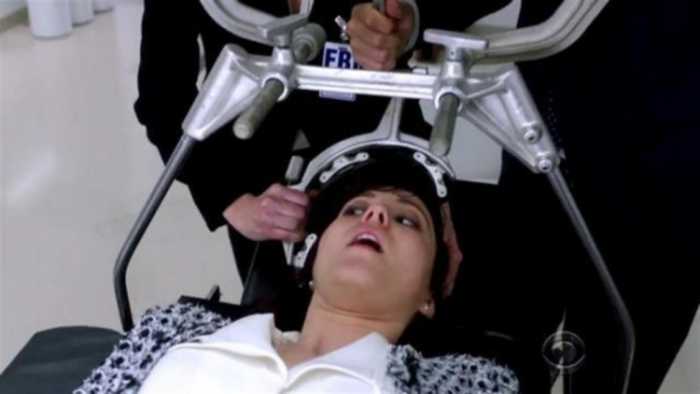
Laurel was in an ambulance which was transporting a doctor who had ants in his head and his head exploded. There are a few episodes where a head exploding occurs and this is explained as the person fighting the ant infestation so the result is an exploding head. Unknown to Laurel, the ambulance driver is a suspected terrorist. The exchange with an FBI agent goes:
FBI AGENT: Can you tell me what happened yesterday in the ambulance?
LAUREL: Yes, um…
FBI AGENT: Have you seen the body?
LAUREL: No. Photos. His head just…exploded.
FBI AGENT: Did you hear a gunshot?
LAUREL: No.
FBI AGENT: One of the EMTs said he heard a gunshot.
LAUREL: No, I would have noticed that.
FBI AGENT: And the driver, was there anything unusual about the driver?
LAUREL: What do you mean?
FBI AGENT: It is just one of our leads. Have you ever met the driver before?
LAUREL: I mean, I don’t even know who the driver is.
FBI AGENT: Ali Wasem. He’s a member of Front Royal. Not on any of our watch lists.
LAUREL: I don’t think it’s about that.
FBI AGENT: About what?
LAUREL: Terrorism.
FBI AGENT: Thank you for answering our questions. 10
A happenstance situation was enough to lead to her being interrogated by the FBI. The interrogator makes a statement which is quite perceptive, just before he is about to begin his grilling (which is halted because of a vote at that moment in a Senate committee against torture):
Here’s the thing about the American public. I was down in Abbeville, Louisiana. Best catfish in the country. And my car got stuck in the mud. This family of farmers came by. Got me out. Invited me home for dinner. Towed my car to a shop. Gave me a few hundred dollars to get me home. They had nothing. And they treated me like I was their son. That’s the American people. They are great individually. Nicest people in the world. But get them in a group, voting? 11
An interesting point where without the influence of bugs on a brain, there would still be problems in Washington. In other words, the political satire that weaves itself through the show is ingrained into the political process.
It is normal to listen to politicians make broad statements that they are standing for principles and that they are on the side of the angels. Flowery and patriotic wrappings often require that questions need to be asked about what is actually occurring. Republicans currently pushing for restrictions on voting, claiming there is a need for election integrity so elections are clean and fair sounds like a reasonable goal. In a 2021 Supreme Court case, however, an attorney representing Arizona Republicans stated, “Politics is a zero-sum game. And every extra vote [Democrats] get…hurts us, it’s the difference between winning an election 50-49 and losing an election 51 to 50.” 12 This attorney was echoing a statement made in 1980 by Paul Weyrich, a prominent conservative and Republican when he said, “I don’t want everybody to vote. As a matter of fact, our leverage in the elections quite candidly goes up as the voting populace goes down.” 13 There is a brief exchange between Senators Luke Healy (Pino) and Red Wheatus (Shalhoub), where higher ideals are reduced to something more practical.
RED: Senator Spitz switched [political] parties because he hated wasting American taxpayers money.
LUKE: No, he switched parties because the Republicans gave him a chairmanship [of a committee] and [Political Action Committee, PAC] money. 14
It is not a recent development that public opinion polls show a decline in trust for political leaders. A Gallup poll in 2016, the year BrainDead aired on CBS and Donald Trump was elected President, saw a 21-percentage point drop in the public’s trust of politicians (42 percent) over the twelve years leading to that election. 15

A decline in trust can be associated with ridicule. Low trust levels and ridicule of the people who are elected to make decisions that affect us all do not help in reaching agreement on basically anything. One online rant went, “Politicians as a whole are less trustworthy than the slimiest of used car salesmen; my apologies to slimy used car salesmen.” 16
TV shows and movies can reflect how the public views many of the people they, in fact, elect to office. In Our Brand Is Crisis (2015, Sandra Bullock, Billy Bob Thornton, Anthony Mackie) “Calamity” Jane Bodine (Bullock), a campaign strategist, is asked a question at the beginning of the movie in a TV interview and the exchange goes:
INTERVIEWER: When you began your career, you must’ve had heroes, role models?
BODINE: Who are my heroes? Well, when I first started in this business, my heroes were politicians and leaders, and then I met them.
Politics is not a term easily understood. An expression such as “That’s politics,” encourages vast numbers of the public to not understand what goes on in Washington can affect them in significant ways. In The Office (2005-2013), Dwight Schrute (Rainn Wilson) says in one episode, “That’s politics baby, get what you can out of someone.” 17 This is the type of quote about politics that reflects the attitudes many can agree with, which is a depressing problem since it through politics that our serious issues need to be addressed. BrainDead, in that sense, that sees politicians as unstable, due to ant infestation in their brains, builds on beliefs that many have had for years.
Politics accepts that there are different positions that people and groups have on a wide variety of issues. It is through politics that solutions can be found to bring together these different points of views. Aristotle referred to politics as the master science, it is the way priorities are established and differences are resolved without bloodshed. It may be understandable for the public to express a distaste for politics, but the alternative is much worse. Since politics assumes that different points of view can exist then the alternative is a system closer to authoritarianism where decisions that affect us are left to a select few. The messy and chaotic are part of the political landscape and, hopefully, out of that disorder and chaos, something good can emerge. Politics also recognizes that no one individual or group has complete control, as a result give-and-take, a degree of flexibility are required to achieve anything. 18
Admittedly, there is theater associated with politics where politicians are inclined to “play to the crowd.” This is unavoidable since politics is taking place on the grand stage of public opinion. This setting brings out not just those with pragmatic attitudes who are willing to participate in the give-and-take that is required to achieve something, often less than what everyone, and every side wants. The theater of politics also brings out the passionate extremes, those who wrap their identities, their sense of self in their political positions. This is when politics as a search for pragmatic solutions takes a turn for the worse, where negotiation and compromise, where problem-solving carry all the features of sounding like surrender and addressing issues can grind to a halt.

Serious issues that will not fade away, whether climate change or poverty are, in fact, political issues. Politics is often seen as a conflict between the what-ought-to-be and the what-is. One work that addressed the Donald Trump Presidency, saw it as an outgrowth of developments that had been underway for some years in America and then added:
Politics should be about solving problems and resolving disputes, not aggravating divisions and hoping that conflicts between different groups of Americans can be exploited, election after election, for immediate political gain. 19
This view contrasts with a political scientist who saw politics as the what-is. This political scientist wrote:
[E]lected officials are held accountable by people who want to know, What have you done for me lately?
…Politics is predictable. …[E]veryone does what they think is best for them.
…[P]eople do what they believe is in their own best interest, whether that’s making as much money as they can or gaining entry to heaven or anything else. 20
The what-ought-to-be addresses aspirations and the belief in a better world, the what-is can be more cynical but, hopefully, leads to good results regardless of the disgusting or nauseating that might be associated with it. Hopefully, out of the disturbing and frustrating something good might emerge. BrainDead addressed some of the conflict between these two views of politics. Laurel states, “I think people come [to Washington] and…they’re idealists and then they get it beaten out of them. Just a little bit every day.” 21
There is a scene where a father visiting Washington with his daughter who has cancer, asks Luke Healy’s office for help in getting them in to see the Lincoln Memorial in the midst of a government shutdown. The National Park Service told him because of the shutdown, all monuments were closed. The senator agrees to help and tells Laurel, “The fact that I’m using someone politically doesn’t mean I don’t care.” 22 The political scientist who said that people do what is in their own best interests, is represented well in this quote.
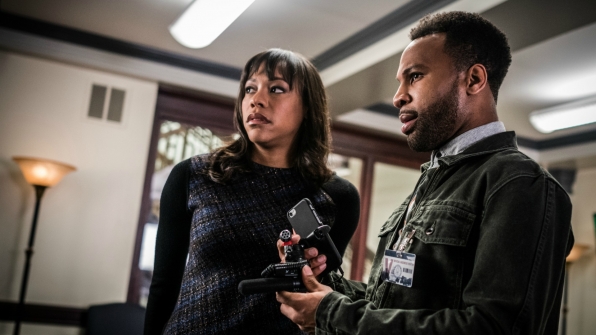
Weaving itself through several episodes of the show is a government shutdown with a catchy tune that opens the episode. Each episode opens with a song (with music) as a way of updating the audience where the story is as that episode begins:
Many are pointing their fingers at the Republican Party for putting 100,000 government employees out of work.
The only thing to come out of the last government shutdown was a lot of new D.C. babies.
But let’s not forget during the previous government shutdown, the U.S. economy lost $24 billion. 23
During the government shutdown, a Lance Corporal Middleton, an Iraqi War veteran meets with Laurel in her position as constituent representative to her brother and he informs her that the government shutdown has affected his ability to have access to clinical drug trials that are helping him stay alive. Eventually, the only way to help the Lance Corporal continue to live is to let Wheatus get publicity shots of him at the bedside of the veteran as he receives drugs to prevent him from dying of liver cancer and to let Wheatus take credit for helping the veteran. The decision by Luke to let Red take the credit for helping the veteran goes:
RED: You got some pictures taken with him?
LUKE: What?
RED: Well, you…you had some nice pictures taken with him? Him smiling, you smiling. You save him, and he’ll hug you, and there’ll be more photos You’ll save him from the big bad Republicans? 24
Wheatus displayed a politician with narcissism on full display, thoroughly enjoying himself in the pictures being taken of himself with the veteran in a hospital bed. The messy and the nauseating that can go with politics, at least achieved something beneficial—it saved the life of a father who wanted to live to be there for his child. Theater was clearly present, although it is necessary to bear in mind that something useful was achieved. Politics as theater and politics as problem-solving interacted to help a veteran, unfortunately the theater is seen more than what was achieved.
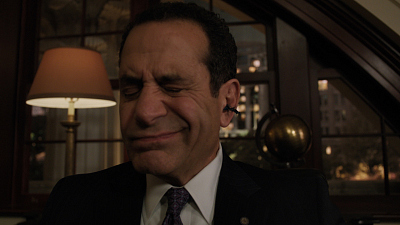
Television Enlightens: BrainDead as a Learning Experience
In the early days of television, there was concern that the quality of TV shows was quite low scale. In 1950, a statement made by a university president could be considered as thoughtful about where television shows stood. He said, “[I]f the [television] craze continues with the present level of programs, we are destined to have a nation of morons.” 25 Television, too much watching, can still have adverse effects—particularly on children who fail to develop other skills, such as reading, but are adept at using a TV remote control.
Television is a convenient way to get news, but it has its drawbacks. Adults who tend to only get their news from TV, and do not read newspapers, are prone to believe that there are simple solutions to complex problems. Donald Trump’s appeal to many was his simple solution of a wall covering the almost 2,000 mile border with Mexico and the belief was that all by itself, the wall would end illegal immigration as a problem: A simple solution for a complex problem, 26 In addition, adults only getting their news from TV can be more easily manipulated to believe certain things, depending on who is doing the manipulation. In other words, many of these people easily latch on to an ideology as an all-encompassing answer to, basically, anything.
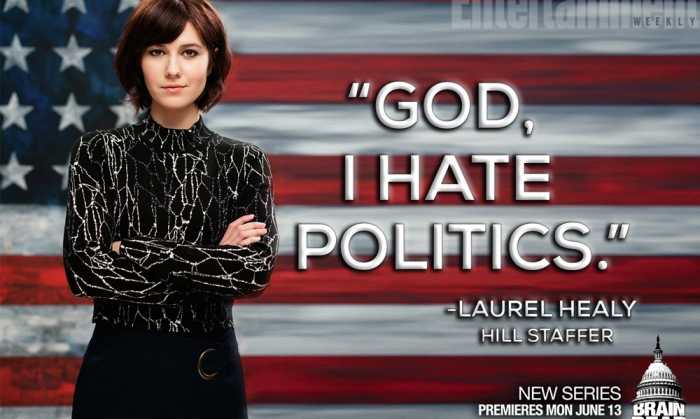
It is always easier for voters, or even non-voters but those with strong political opinions, to voice loudly that they are liberal or conservative, it avoids the messiness of having to do difficult and often complex thinking about, well, complicated issues. 27 An exchange in BrainDead reflects the shallowness of thinking, often associated with simply using ideology as a basis for tackling political issues. Laurel has a brief exchange with a constituent which reflects cursory thought:
LAUREL: So how can I help you, Dr. Bobb?
DR. BOBB: Oh, um… The government’s too big, don’t you think?
LAUREL: Too big?
DR. BOBB: Yes, can [your brother] make it smaller?
LAUREL: Okay. Is that it?
DR. BOBB: Yes, thanks. 28
Ideology taken to an extreme was expressed well in a poem about the pandemic we are all living through and, hopefully, is brought under control:
When did we decide that
Ideology should be allowed to trump
Common sense, common decency,
Common colds
Uncommon-but not unexpected-pandemics? 29
Politics as theater encourages and pushes ideology so that problem-solving is seen as the enemy to the purity of political principles. There is a place for principles and values, but reason and judgment still need to matter.
A television show, such as BrainDead, can make a contribution to reason and judgment. TV shows have shown a surprising evolutionary development and BrainDead needs to be seen as part of that development. One writer stated:
Of every entertainment platform there is, perhaps none has changed so much, and so quickly, [as] television. In just the past few years alone, the medium has gone from being labeled a silly, inferior substitute to movies (“I don’t even own a TV!” said many a bit too proudly) to being hailed as the replacement for film, due to the rise in high-quality cable shows like Game of Thrones and Breaking Bad. 30
A broad cross-section of the public getting their news from watching television news shows is not necessarily a good thing. Television news shows often lack substance which does not encourage a way of thinking where viewers appreciate the difficulties of addressing any complex issues. A respected journalist, Robert MacNeil, who co-hosted The MacNeil/Lehrer NewsHour on PBS (1975-1995) that is now known as the PBS NewsHour, wrote that, “Even the longer, more serious TV news programs…are still bedeviled by superficiality. …[TV news cannot] escape the tyranny of show business ideas of pacing. To be dull is worse than being uninformative.” 31 MacNeil wrote this in 1968, well before the 24-hour news channels of CNN, MSNBS, and Fox News. Despite all the hours in a day to address issues in substance, basically these stations are still more interested in the “business ideas of pacing.” A show such as BrainDead can compensate for some of what television news watchers are not getting, it can help to develop in viewers an awareness of some of the intricacies that are associated with politics. One article about television stated, “A wave of new social science research shows that the quality of [TV] shows [we watch] can influence us in important ways, shaping our thinking and political preferences, even affecting our cognitive ability.” 32
Robert King said, “There seemed to be some sense of people no longer thinking for themselves. They were kind of attaching themselves to a bigger ideology.” 33 The simplicity of assuming that everything is liberal or conservative fits well into what is known as the Politics of Either/Or. The Politics of Either/Or, was expressed well by Michelle King who stated, “[The show is] a statement that you need moderation, for people to be talking to each other. When everyone becomes too extreme…they can’t discuss, they can’t compromise, and nothing gets done. The extremism really is a dangerous thing.” 34 Choices and solutions to problems are seen in extremes where the choice is one extreme or the other with no room between the two for resolving basically anything.
Some proposed solutions that are meant to look like bipartisanship, however, need to be seen as nothing more than theater, which raises the issue that searching for bipartisan may not necessarily always be the solution to reducing the dysfunctional in Washington. House Minority Leader, Representative Kevin McCarthy (R, CA) saying he supported Nancy Pelosi’s call for a bipartisan commission to probe the January 6, 2021 Capitol riots, which were egged on by Donald Trump’s claim he won the 2020 election and adding that the probe needs to include Black Lives Matter and Antifa, is simply good theater. McCarthy attempted to make himself look like he is the one interested in honest hearings when he said, “I’m the one who asked for a commission, it’s Speaker Pelosi who is trying to make it partisan. This is too important to negotiate in the press.” 35 There is absolutely no evidence that Black Lives Matter or Antifa were involved in the Trump-inspired riots but McCarthy knows how to play to his side and he has every intention to continuously play to the press. In addition, McCarthy claimed Trump did not know about the riots until he called him, which contradicted what a Trump advisor told the Washington Post—that Trump was watching it on television. Trump’s response to McCarthy was, “Well, Kevin, I guess these people are more upset about the election than you are.” 36 McCarthy, subsequently, changed his mind and stated he was against creating this commission. There is no need for ants anywhere in here, politicians displaying odd brain behavior are on display without them.

John Boehner, the former Republican Speaker of the House of Representatives (2011—2015) in his memoir was overly critical of what he called the “crazies” in his political party in Congress. His description of Senator Ted Cruz (R, TX) sounded like an ant infested brain in Washington, “There is nothing more dangerous than a reckless asshole who thinks he is smarter than everyone else.” 37
The Kings were inspired by what they saw as politics unfolding in Washington, again, this before Donald Trump was elected President. Robert King stated, “The connection we made in our minds was, that’s the way horror movies work.” The movie that came to King’s mind was Invasion of the Body Snatchers (1956, starring Kevin McCarthy, Dana Wynter, Carolyn Jones). 38 The premise of the movie was that spores from outer space land on earth and turn into pods capable of replicating people when they sleep. When the pod-created people awake, they display no emotion and an inability to think for themselves. The point that Robert King was making was that political ideology as an overriding way of understanding much of anything essentially does much the same thing to non-pod created people—ideology serves to create mindless automatons.
The term often used to describe this allegiance to a political ideology is “political tribalism,” which is not a problem in itself, the issue is how far does it go in preventing reasonable and pragmatic solutions to issues and whether it paralyzes basically anything going forward in Washington. In episodes of BrainDead, there are scenes that show political tribalism in action and any attempts at resolving issues are nonexistent. Briefly, at the beginning of the first episode, there is an exchange between Senators Red Wheatus and Luke Healy, where a solution to an issue looks likely, but then the ants take over.
The Kings have the ants working together, much as politicians and the public unite behind a political ideology happens in the real world of Washington politics. On the night that Barack Obama was inaugurated as President (January 20, 2009), it was reported that leaders of the Republican Party had a dinner meeting where they vowed “united and unyielding opposition to the president’s economic policies” and at that point they had not even seen his proposed economic policies to help the economy during the severity of what has been called the Great Recession (2007-2009). Just blind opposition drove Republicans to take their stand without even hearing what Obama would eventually propose as his solutions to address serious economic issues. 39 This recession was global in scope but in the United States besides unemployment that hit double digit figures and the collapse of the housing market, there was the need for bank bailouts and federal government loans to the auto industry to keep them afloat. Just because there was a severe economic crisis did not necessarily mean there was a need to come together for the good of the country.
Mitch McConnell (R, KY), who, at the time, was Senate Minority Leader, stated, “The single most important thing we want to achieve is for President Obama to be a one-term president.” This quote, however, which is often referred to, needs to be understood in a broader context. McConnell made this statement almost two years into the Obama President and several weeks before the 2010 Congressional elections. In that same statement he also said, “If President Obama does a Clintonian backflip, if he’s willing to meet us halfway on some of the biggest issues, it’s not inappropriate for us to do business with him.” 40 Compromise, the give-and-take politics, is difficult to navigate. There is an adage, “What’s mine is mine; what’s yours is negotiable,” can be the sentiment that sinks any real compromise. One study on compromise stated:
[T]he need to shift the balance in democratic governing more toward the compromising mindset and the promotion of political compromises it makes possible. But our defense of compromise is consistent with, and indeed requires, a vigorous and sometimes contentious politics in which citizens press strongly-held principles and mobilize in support of bold causes. Social movements, protest struggles, and electoral campaigns are among the significant sites of this kind of politics, and they play important roles in democratic politics. 41
In the 1980s, while Ronald Reagan was President, Newt Gingrich, then a Republican Congressman from Georgia, pushed the notion that Republicans in Congress needed to demonize Democrats. Democrats and Republicans today are often seen as existing in “ideologically segregated parties,” but this has been developing for several decades. Compromise becomes more difficult, if not impossible, in this type of political climate. Political polarization, seen as more pronounced today, than might have been the situation in the past, makes compromise, or moderation in politics, seem like a fantasy. 42 It is understandable how the Kings were inspired by what they saw in Washington to create BrainDead.
The political environment which the Kings saw and comes to life in BrainDead, is one that we are living in where the search for reasonable conversation and civility can be easily overwhelmed by rancor and hostility that becomes more acceptable and almost expected. It is within his environment that what was acceptable and unbelievable can merge to create a new level of politically normal. This new level of politically normal is not helpful to finds ways to mutually address issues.
BrainDead on the Believable, Unbelievable, and the Real
In the fourth episode of BrainDead, Wheatus suggested, although in a mild way, that there is a need to take up arms against liberals. Three years after this show finished its thirteen episodes, Marjorie Taylor Greene (R, GA), before being elected to the House of Representatives, posted a comment that Nancy Pelosi (D, CA), Speaker of the House of Representatives, needed to be removed from power and waiting for the next election was too slow a process, so that “a bullet to the head would be quicker.” 43 That life can imitate art is a rather common expression to hear but it takes on a certain eeriness when seen in real life.

There is an episode where Wheatus proposed cutting funds to the Centers for Disease Control (CDC): Cut the funds, learn less about a problem. The reason for Wheatus’ action was because an ant was captured, taken to a CDC lab, dissected and determined that, in fact, the ants were from outer space (no reason to get too specific wherever they were from, just out there). In 1996, Congress passed the Dickey Amendment which says in part, “none of the funds made available for injury prevention and control at the Centers for Disease Control and Prevention (CDC) may be used to advocate or promote gun control.” The amendment did not precisely say that the CDC could not study gun violence and tackle solutions to address it, but the amendment had a chilling effect on the CDC. One writer wrote on the impact of the amendment, “Precisely what was or was not permitted under the clause was unclear. But no federal employee was willing to risk his or her career or the agency’s funding to find out. Extramural support for firearm injury prevention research quickly dried up.” 44 That gun deaths are among the five top reasons for deaths to people under 65, would seem to call for CDC research but their investigations on gun violence do not exist: Wheatus’ action on CDC funding reflected an actual situation. While the show takes place all in a relatively recent setting (in fact on a television scene in the background, are the faces of Hillary Clinton and Donald Trump showing developments leading to the 2016 election) there are aspects of the show that have deep roots in actual Congressional actions. Again, while the show centers on a particular period, the months leading up to the 2016 election (which is not featured in the series, just background), much of what can be seen as believable and real in fact, again, spans decades.

In 2015, as the writers for BrainDead were going over storylines, one proposal was to have a Supreme Court Justice die. Michelle King said the idea was dropped because, “We rejected it because it felt a little absurdist and too far out.” 45 Then four months before the first episode of the show was on CBS, Supreme Court Justice Antonio Scalia died. Senator Mitch McConnell (R, KY), then Senate Majority Leader stated, ten days after Scalia’s death that since 2016 was a Presidential election year, Obama would not be allowed to get a Senate hearing for any nominee he put forth. Approximately one month later Obama announced Merrick Garland as his Supreme Court nomination. Garland, at the time, was a judge on the United States Court of Appeals for the District of Columbia Circuit, now he is Attorney General in the Biden Administration. Garland’s nomination sat in limbo and when Donald Trump won the 2016 election, he nominated Neil Gorsuch. As one writer put it, “never before in American history has the Senate simply refused to let the president nominate anybody at all simply because it was an election year.” 46
Supreme Court Justice Ruth Bader Ginsburg died about six weeks before the 2020 Presidential election. On her deathbed she issued a request, “My most fervent wish is that I will not be replaced until, a new president is installed.” Donald Trump announced Amy Coney Barrett’s nomination to the Supreme Court on September 26, eight days after Ginsburg died, a month later she was a Supreme Court Justice. How many storyline ideas ended up on the cutting room floor? Where is the line between what can seem reasonable and somewhat believable and too far removed to be believed?
BrainDead offers a degree of escapism and requires that reality needs to be suspended, but watching this show displays topics that are still very much part of politics without ant infestation. Take the ants out of the series and there are lots of plots and subplots that are politics as the usual.
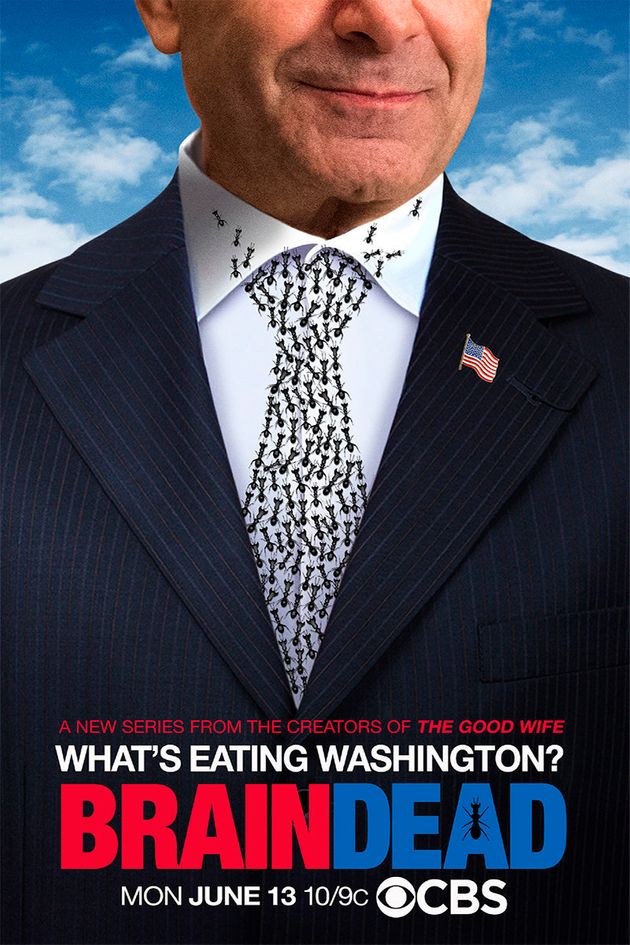
There is an episode where Wheatus wants to get something on Laurel to prevent her from investigating the ants. By this point in the series, Wheatus is aware that Laurel knows about the ants and that they get inside brains. The Senator hires a political opposition researcher to dig up dirt and the researcher discovers that Laurel had sex with Michael Moore (who plays himself in the episode where he briefly appears). Gareth Ritter (Tveit) who is chief of staff for Wheatus and, who has been having an on-again, off-again relationship with Laurel is determined that Laurel having had sex with Michael Moore means the end of their relationship. All Ritter can do is picture Laurel in the arms of Michael Moore. The exchange between Laurel and Gareth when he reveals to her what opposition research has uncovered, lays the groundwork that a line has been crossed in their relationship and they cannot go further. But this is television, and their relationship would continue and, as it turned out, the opposition research was wrong, and Laurel did not sleep with Michael Moore:
GARETH: The newest oppo research has you sleeping with
someone I know is wrong.
LAUREL: Really?
GARETH: Yeah. You want to know who?
LAUREL: Sure, if you want to tell me.
GARETH: Michael Moore. You know, Michael Moore,
the liberal.
LAUREL: I do.
GARETH: I told the researcher that that couldn’t be true.. I mean, you and Michael Moore
LAUREL: Good
GARETH: It’s not true, right?
LAUREL: Why don’t we get dinner.
GARETH: There are certain names, to a Republican. I mean, what would the equivalent be? If I slept with Ann Coulter?
LAUREL: Have you slept with Ann Coulter?
GARETH: No.
LAUREL: Good. Then let’s get dinner.
GARETH: Did you sleep with Michael Moore?
LAUREL: Do you really want to know?
GARETH: I don’t know. Yes. 47
Two months after the series ended its CBS run in September 2016, Donald Trump was elected President. OKCupid, an online dating site reported that soon after the election, there was a 64 percent increase in political terms used in the profiles of people looking for dates on their site. 48 In 2017, during Trump’s first year as President, eHarmony, another dating site, saw almost half of the profiles refer either positively or negatively about Trump. One report stated:
For most Americans, dating someone who has a different view of the president would be a nonstarter. Sixty-three percent of Americans say they would not consider dating someone whose views on Trump differ from their own. Thirty-seven percent say they would consider it.
Trump is more of a deal breaker for women than men. Nearly seven in 10 (69 percent) of women say they would be unwilling to date someone whose views of the president did not align with their own. Men are somewhat more divided. 49
Another report had a dating adviser state while Trump was President, “Politics seems to be joining singles on dates more than ever, mostly because of the visceral reaction someone might have if their date voted for the current president.” 50 In a 2020 survey, 71 percent of Democrats interviewed for the survey said they would not date someone who voted for Trump. The survey referred to terms such as “closed minded,” or “immoral,” and said they found it “stressful and frustrating” to talk about politics with someone who voted for Trump. 51
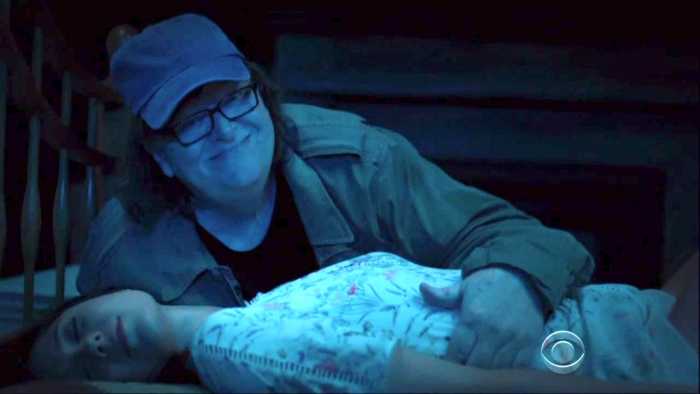
What seemed comical on a summer 2016 television show, took on dating importance over just the next year. This attitude toward dating reflects continuing tensions from the Trump Presidency that still affect the public. Battle lines in dating carried over to affect politics which reflect that political polarization with its emphasis on tribalism is there on that first date.
That so much of the public, more Republicans than Democrats, believe there was significant voter fraud associated with the 2020 Presidential election is a disturbing attitude. In 2004, there was a belief by a number of Democrats that John Kerry, their candidate, had defeated the incumbent President, George W. Bush. Even two years after that election there was still a belief in voter fraud. Robert F. Kennedy, Jr, wrote, “After carefully examining the evidence. I’ve be become convinced that the president’s party mounted a massive, coordinated campaign to subvert the will of the people in 2004.” 52 The level of political hostility following the 2020 election, is well beyond what was a small blip on the political radar screen in 2004. Between the 2004 and 2020 elections, political polarization has become more pronounced.
Storylines in BrainDead, such as the threat to shoot a politician, or cuts to CDC funding, or the deaths of Supreme Court justices and where that took the country, or dating issues are all an outgrowth of political polarization. By viewers seeing them in politically satirical ways, they may be able to take a step back and try to develop some broader perspectives on politics which may help to reduce political tensions and lead to Michelle King’s hope for moderation leading to constructive conversations.
The Politics of Polarization: The Ants Play to the Crowd but this is a Two-Way Street
Political polarization encourages more overt public displays of passions. In September 2009, while President Obama was delivering a message to both houses of Congress on healthcare, Representative Joe Wilson (R, SC) felt the need to yell out “you lie.” Demonstrations of political grandstanding seen in BrainDead are not new, but these types of public display do adversely affect the capability of lawmakers to address serious issues.
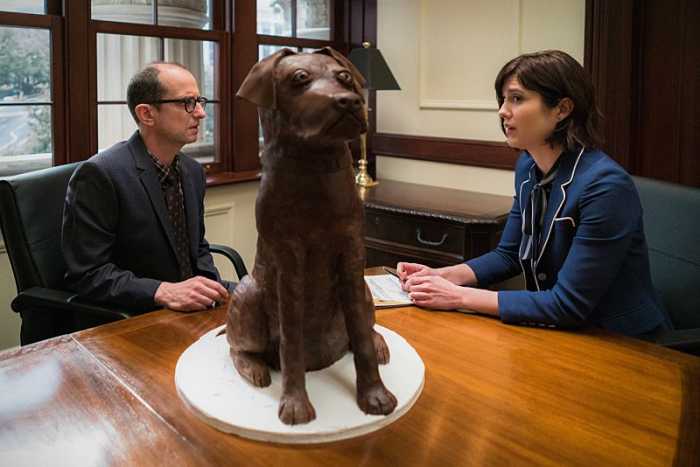
In a committee hearing, grandstanding as a part of political polarization is on full display when something as trivial as the naming of a Capitol hallway is addressed:
Committee Chair: Last session, we were considering renaming the West Entrance Capitol Kiosk the Sharie Kiosk after Ed Sharie, a decorated Capitol police officer who was killed in the line of duty. And if there are no objections, I move we so vote.
Luke: I second…
Red: Mr. Chairman, point of information. Are we really considering having a Capitol kiosk, a kiosk where little kids can buy candy bars, christened with a name sounding like “Sharia”?
Committee Chair: I’m sorry, what?
Red: I said, I’m wondering if this committee is fully aware that this name will sound to many visitors like “Sharia law”?
Luke: Senator, it’s not named after Sharia. It’s named after Sharie. Ed Sharie. 53
Political polarization reaches deep into Congressional actions and politics matters regardless of the issue. In BrainDead, the all-pervasiveness of politics is expressed in an exchange between Luke Healy and Red Wheatus:
LUKE: Come on. Not everything’s about politics.
RED: Even you don’t believe that.
Political polarization encourages a view that all life around us is centered on politics. Politics as a cultural backlash, where reaction against cultural changes and what is perceived as value changes are the driving forces of polarization, matter more than problem-solving. 54 A political scientist made an observant comment about what is now occurring in Texas within the Republican Party in the aftermath of the 2020 Presidential election, where voter fraud is believed to be the reason for Trump losing the White House and questioning the validity of voter fraud can put a Republican’s career in jeopardy. This belief has now reached the level of being an article of faith that it cannot be challenged on any rational level, despite numerous court cases that have found no support for voter fraud. His comment is about Texas Republicans but reflects much of what is occurring nationally within the Republican Party. “If what you’re confronting is a party made up of a shrinking base of ever more — not ‘conservative,’ not just ‘right-wing,’ but people who believe in conspiracies, it gets really hard to govern.” 55 This is where BrainDead let the viewers down: The show is centered around political participants with political power or access to that power. There are moments that highlight the broader public and the passion that they bring to politics but those are limited and not central to the series. Since BrainDead focused on political polarization as its central point, by only concentrating on members of Congress, and occasionally straying away from that institution, it failed to give the viewers insight into political polarization as supported by both politicians who publicly display their cheerleading status and that part of the public that both encourages them and elects them to public offices.
In April 2021, it was announced that Representative Greene (R, GA), who was referred to earlier in this essay raised more than $3 million in fundraising, which is a surprising amount of money. Representative Adam Kinzinger (R, IL) who is a moderate voice for Republicans stated, “What that tells me is that, you know, at least when it comes to some of the [political] base and small dollar fundraising, saying crazy stuff is going to get you some money, unfortunately it’s a pattern that we’ve learned works.” 56 Greene proposed the creation of a political caucus in Congress called “America First Caucus.” These Congressional caucuses, and there are several, basically bring together like-minded members of Congress to discuss issues. The caucus Greene proposed (which was quickly tabled and so never got off the ground because of backlash, even from ranking Republicans in Congress) was to focus on “Anglo-Saxon political traditions,” and was to address threats to America’s “unique identity,” and a return to, “[an architectural style that] befits the progeny of European architecture.” All the buzz language created the impression that Greene wanted to focus on whites-only and the criticism was that she wanted to return to some earlier era with minorities put in their place. Greene can be seen as a leader advancing political polarization, but, at the same, her more than $3 million collected in fundraising came willingly from many small donors. Of the money she collected, 91 percent came from donations outside of Georgia, her home state. A New York Post article put her fundraising in perspective, “The donations make her the second most prolific fundraiser in Congress for the quarter, behind only House Speaker Nancy Pelosi, who raised $4 million. Rep. Alexandria Ocasio-Cortez raised…$2.8 million during the same period.” 57

Wheatus created a grassroots organization called the One Wayers. In politics, creating a fake organization that is labeled as grassroots, implying that it was created by just everyday ordinary folks, is called “astroturfing.” In other words, Wheatus did something that has a long history in politics. The term was popularized by then Senator Lloyd Bentsen (D, TX) in 1985. Bentsen had been receiving a large amount of mail, addressing insurance industry regulations and he stated, “A fellow from Texas can tell the difference between grass roots and AstroTurf. This is generated mail.” 58 In BrainDead, Wheatus states, regarding his grassroots organization, “We need a grassroots organization we can create and control. We’ll call…the One Wayers.” 59 An exchange between a constituent of Wheatus’ and Gareth, his Chief of Staff, addresses the One Wayers, but creates the illusion that it was not Wheatus creating it in the first place:
CONSTITUENT: I’m angry. We’re losing our country. They’re taking it away bit by bit.
GARETH: I know. And that’s why Senator Wheatus needs your help.
CONSTITUENT: He’s one of you. We’re sick of words; we need action. It’s like the Red Coats all over again.
GARETH: Yes. And that’s why Red Wheatus wants you to form the One Wayers. It’s a grassroots campaign created and run by good citizens like yourself. 60
The creation of the One Wayers subsequently led to an exchange between Laurel and a constituent by the name of Noah Feffer which goes:
LAUREL: How may I help?
NOAH: I’m angry.
LAUREL: Regarding?
NOAH: Everything.
LAUREL: The thing is, the more specific you get…
NOAH: Income inequality, childhood diseases, big oil, your brother [Senator Healy] cutting the National Endowment of the Arts. Why is he doing that?
LAUREL: Well, I think it’s more about reopening the government.
NOAH: Oh, no, no. It is about giving in to the fascists. Now, we need to take the fight to the Republicans. When they kill a hostage, he needs to kill a hostage. When they hold a knife to his throat, he needs to hold a knife to theirs. Look at Finland and Denmark…why can’t we be more like them?
LAUREL: Okay. I will tell Senator Healy. Thank you.
NOAH: Why aren’t you angry?
LAUREL: Why aren’t I? I’m the constituent caseworker here…
NOAH: Our country is in mortal danger. Why can’t you see that? We need a political revolution. You-you just sit there, but the One Wayers, they count on us being peaceful and calm. What…You haven’t heard a word I said.
LAUREL: I have. Every word. Even if I don’t sound angry…
NOAH: Don’t patronize me! Now, they are armed, because they have the [National Rifle Association], so we need to arm ourselves.
LAUREL: Okay. Thank you, sir. I’m needed in another meeting.
NOAH: Oh, that’s all you have to say? This isn’t over.
LAUREL: Actually it is. Good-bye. 61
Political polarization, in real time politics consist of two interacting groups. One group are elites, which include politicians, influential lobbyists, and often political analysts who are already committed to their political tribe so have little of substance to add to much of anything but lots rationalizing about why their side in on the side of the angels. A TV news show where politicians frequently appear on BrainDead is called DoubleSpeak, which would, no doubt, tickle the heart of George Orwell (OK, he is dead, maybe the ants can bring him back). As part this broader way of looking at political polarization, the other group is the broader public who have basically little connection to the people they elected (assuming they voted in the first place), but who display a passion for extreme political thinking and, sometimes, a willingness to believe any bit of false information about political opponents, particularly if it is wrapped in a good conspiracy. Political science literature is filled with addressing political polarization as either beginning and continually pushed from the top (elites) or driven by the bottom (mass public). It would have been interesting if BrainDead had made a stab at addressing the conflict between these two different approaches toward political polarization, outside of some brief scenes scattered throughout the series.
Television as Thoughtful: The Ants Gave Us Something
BrainDead was cancelled after its summer run. The show debuted with 4.6 million viewers and it went down from there. Robert and Michelle King had plans for four seasons, where the ants infested Wall Street, Hollywood, and Silicon Valley, after infecting Washington. 62
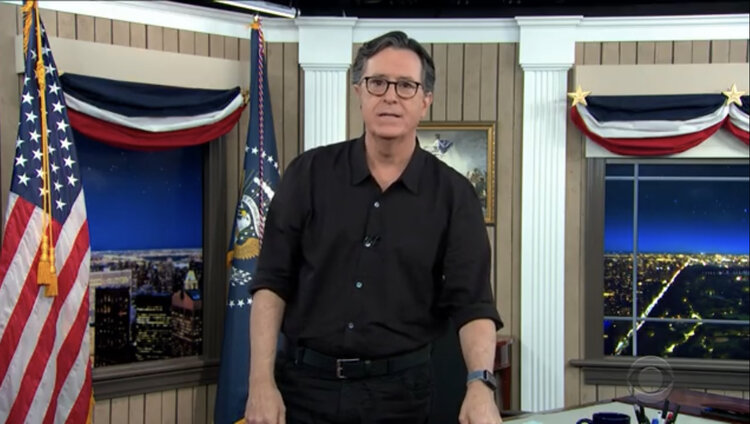
Jon Stewart, Stephen Colbert, and Trevor Noah, do political satire that is more direct in the sense that they first address a precise issue or politician or something foolish and odd that Fox News or One America News (OAN) had on one of their shows, and then they add their comments which are often satirical and biting. The audience can see the immediate connection between what they are saying and referring to—that was not the case with BrainDead. There is an exchange between a woman working in Senator Healy’s office, Scarlett who the senator had sex with, and the Senator:
SCARLETT: Senator? Democratic Caucus in five minutes.
HEALY: On my way. It’s the first caucus after losing the majority.
SCARLETT: You going to be all right?
HEALY: It’s just the usual Democratic bloodletting. 63
Or there is a statement made by a Democratic Senator in a caucus meeting:
I am delighted to see the members of this caucus get angry. Finally. Unfortunately, as usual, our anger is being directed at ourselves. 64
Dialogue such as this is different than listening to Colbert or Noah. Furthermore, there is an exchange between Laurel and Gareth, as their relationship was beginning:
GARETH: Are you going to Tax Prom?
LAUREL: Am I… What?
GARETH: Going to Tax Prom.
LAUREL: I have no idea what that is.
GARETH: It’s a prom run by tax lobbyists. Tax Prom. Hill staffers dress up, get drunk, argue about Paul Krugman, vomit on the sidewalk. It’s pretty fun.
LAUREL: I can’t tell if you’re being serious.
GARETH: I’m being serious. 65
The audience needs to know that Paul Krugman is a columnist for the New York Times and, perhaps had read some of his writings, to fully appreciate this exchange. Exchanges like these are scattered throughout the thirteen episodes and are not like the political satire of The Daily Show, The Colbert Report or the monologues on late-night shows like The Tonight Show and The Late Show.

In one scene an FBI agent says to Laurel about a leak, “Claudia Monarch has been given the full Judith Miller. She’s in jail, and I don’t think she’ll last that long.” 66 Miller was a New York Times reporter who is best known for inaccurate or false reporting on Iraq having weapons of mass destruction (WMD). The WMD program was the rationale for the United States’ invasion of Iraq in 2003. That was not, however, the reason she went to jail but rather her involvement in what is known as the Plame Affair. Valerie Plame was a Central Intelligence Agency (CIA) spy was who outed by Miller and Miller spent 85 days in jail for not revealing her source. The source turned out to be Scooter Libby, who was Chief of Staff to the Vice President of the United States (Dick Cheney). To appreciate BrainDead’s reference to Judith Miller, requires some background information on the part of viewers.
It may be asking too much, but it would be refreshing if the ending of each episode were to include a brief discussion on some of the issues addressed in that particular episode and suggestions where viewers might search to learn more. While the show is only in re-runs, the original cast, writers, even the Kings, could add comments, using the Frontline model as a guide. The Kings were committed to the premise of the show and expressed why they were inspired to develop it so there is no reason that additional material cannot be added at the end of each episode. This would certainly add a twist to the way a television show is viewed.
Using television shows for educational purposes dates back to the 1950s, but the emphasis was on instructional learning and focused on children. A study that addressed the impact of television asked the questions, “Does [television] increase viewers’ knowledge and awareness of the problems in…society? Does it stimulate thoughtful consideration of the issues?” 67 The answer that this study reached was that specific programs do have positive effects but only for a short-term. The proposal presented here is unusual, that a show created for entertainment, but the brainchild of creators who saw a problem (Robert and Michelle King) can take the step of adding something that is different: Essentially endnotes to help viewers use the show to enrich their political understanding. There are sites online that can aid viewers to learn how to do research on their own 68 but a “public service” tool at the end of each BrainDead episode may lead to more than just short-term positive effects.
The RAND Corporation, a well-respected research institute, has released a number of studies addressing the need to improve civics so that students learn skills to understand fake news (or as RAND refers to it, “Truth Decay”) and, in the process, become better prepared to function well in our political system. 69 Civics has traditionally been focused on learning some basic issues associated with citizenship, exactly what those basic issues are is never clear, but RAND has broadened their view of civics to include media analysis, which addresses both television and the various platforms of social media. Not to make too much of it, but this sounds like highly aspirational thinking and the chances of more or different approaches to civics education, somehow improving the quality of political discourse in this country is questionable. In addition, civics education would imply that it ends at high school graduation. What is needed are ways to reach adults, and television shows used well, and productively, may offer a more immediate solution toward moving political discourse in a more positive direction away from increased distrust and animosity, and simply more unconstructive conversations.

BrainDead has the potential to reach a more diverse audience than might be the case with Trevor Noah, Steven Colbert, Jimmy Kimmel, or Jimmy Fallon. In the case of The Late Show (Colbert), The Tonight Show (Fallon) and Jimmy Kimmel Live, viewers who consider themselves as liberal or moderate make up between 66-83 percent of the audience. 70
The move to Paramount+, a subscription service, from free TV (CBS) may impact the long-term viewership of BrainDead, and it may provide a means of understanding that the two types of political satire watched on the small scene (direct as in late night talk shows) and indirect (as in BrainDead), can flourish but in different small scene settings. Regarding free TV, viewership among the demographics between 18-49, which a show such as BrainDead would be aimed at, declined significantly over the five years leading up to the debut of BrainDead on CBS in 2016. There had been a slight decline in viewers over 50 but it is questionable how much the show was attempting to attract these older Americans. 71 Interestingly, political satire may increase political participation. 72 One study stated, “satire mobilizes viewers to political action.” 73 BrainDead through its indirect approach to political satire, can offer hope that somewhere out there in a very weird political universe there is a bright future for a well-functioning American democracy. A television show with an amusing angle to political satire, might aid civics in ways different from a classroom.
BrainDead is good show, even in re-runs on the Paramount+ channel, although someone there must be suffering from ant infestation since only the first twelve episodes are on and the final episode, which brings everything to a conclusion, is not. 74
Works Cited
- ‘BrainDead’ Cancellation on CBS: Robert King on Show Ending | TVLine ↩
- The Irony of Satire: Political Ideology and the Motivation to See What You Want to See in The Colbert Report – Heather L. LaMarre, Kristen D. Landreville, Michael A. Beam, 2009 (sagepub.com) ↩
- https://washingtonpost.com/new/the-fix/wp/2014/04/10/the-conservatism-of-stephen-colbert/ ↩
- CBS explains why they picked Colbert | EW.com ↩
- Colbert Will Host ‘Late Show,’ Playing Himself for a Change – The New York Times (nytimes.com) ↩
- Why Arkansas Is a Test Case for a Post-Trump Republican Party – The New York Times (nytimes.com) ↩
- Stephen Colbert: ‘Late Show’s’ Jeb Bush Interview Lacked Satire – Variety ↩
- Stephen Colbert Brings His ‘Colbert Report’ Alter-Ego to ‘The Late Show, in Time for Donald Trump’s Republican National Convention – The Atlantic ↩
- A good professional journal is Misinformation Review, found here: HKS Misinformation Review (harvard.edu) ↩
- 01×02 – Playing Politics: Living Life in the Shadow of the Budget Showdown – A Critique – BrainDead Transcripts – Forever Dreaming ↩
- BrainDead: Season 1, Episode 7 script | Subs like Script ↩
- In Supreme Court, GOP attorney defends voting restrictions by saying they help Republicans win (nbcnews.com) ↩
- Trump says Republicans would ‘never’ be elected again if it was easier to vote | Donald Trump | The Guardian ↩
- 01×02 – Playing Politics: Living Life in the Shadow of the Budget Showdown – A Critique – BrainDead Transcripts – Forever Dreaming ↩
- Americans’ Trust in Political Leaders, Public at New Lows (gallup.com) ↩
- Politicians: Less Trustworthy Than Dishonest Used Car Salesmen – The Daily Rant (mychal-massie.com) ↩
- YARN | That’s politics baby, get what you can out of someone, | The Office (US) (2005) – S01E04 | Video clips by quotes | 3f60f430 | 紗 (getyarn.io) ↩
- An excellent work which addresses politics, in this case by a British political scientist is, Bernard Crick, In Defence of Politics. An online copy can be found here: In defence of politics : Crick, Bernard, 1929- : Free Download, Borrow, and Streaming : Internet Archive ↩
- E.J. Dionne, Jr., Norman Ornstein, & Thomas Mann, One Nation After Trump: A Guide for the Perplexed, the Disillusioned, the Desperate, and the Not-Yet Deported, New York, St. Martin’s Press, 2017, p. 187 ↩
- Bruce De Mesquita, The Predictioneer’s Game: Using the Logic of Brazen Self-Interest to See & Shape the Future, New York, Random House, 2009, pp. xii-16 ↩
- 01×02 – Playing Politics: Living Life in the Shadow of the Budget Showdown – A Critique – BrainDead Transcripts – Forever Dreaming ↩
- 01×02 – Playing Politics: Living Life in the Shadow of the Budget Showdown – A Critique – BrainDead Transcripts – Forever Dreaming ↩
- 01×02 – Playing Politics: Living Life in the Shadow of the Budget Showdown – A Critique – BrainDead Transcripts – Forever Dreaming ↩
- 01×05 – Back to Work: A Behind-the-Scenes Look at Congress and How It Gets Things Done (and Often Doesn’t) – BrainDead Transcripts – Forever Dreaming ↩
- Television Effects on Education, Revisited | Psychology Today ↩
- I addressed Trump’s wall here: The Wall by The Donald and The Wall by Pink Floyd | The Artifice (the-artifice.com) ↩
- Joseph A Cernik, “Watching TV News: Should We Approach It Like Reality TV?” in Lynda Leavitt and Shirley Wisdom, eds., Handbook on Advanced Critical Thinking in Higher Education, Hersey, PA, IGI Global, 2015. I wrote about a classroom exercise I conducted where students watched a segment on a TV news show about an international incident and after writing what they learned from it and what types of questions they asked themselves, had the students do the same thing after reading newspaper articles on the incident. The contrast was significant—particularly regarding the capability of students to be more proactive and ask questions after doing the reading, whereas the same was missing after watching a TV news show segment. It is useful to think of TV news as “Headlines Only.” Found here: Watching TV News: Should We Approach It Like Reality TV?: Education Book Chapter | IGI Global (igi-global.com) ↩
- 01×03 – Goring Oxes: How You Can Survive the War on Government Through Five Easy Steps – BrainDead Transcripts – Forever Dreaming ↩
- Stop It! — 433 (fourthreethree.org) ↩
- Evolution Of The Television Drama, From Studying 1980 To Predicting 2020 (bustle.com) ↩
- Robert MacNeil, The People Machine: The Influence of Television on American Politics, New York, Harper & Row, Publishers, 1968, p. 36. ↩
- You Are What You Watch? The Social Effects of TV – The New York Times (nytimes.com) ↩
- BrainDead: Michelle and Robert King compare new series to The Good Wife | EW.com ↩
- Ibid. ↩
- Fox Host Confronts Kevin McCarthy on Demand BLM, Antifa Be Included in Capitol Riot Probe (msn.com) ↩
- Opinion | Kevin McCarthy shows why the country needs a Jan. 6 commission – The Washington Post ↩
- John Boehner’s New Memoir: Five Biggest Revelations (nymag.com) ↩
- The Kings Share Four-Year Plan For ‘BrainDead’ | Broadcasting+Cable (ampproject.org) ↩
- How CBS’s Political-Zombie Drama ‘BrainDead’ Fumbles Its Politics (but Remains Promising) | The Village Voice ↩
- When did McConnell say he wanted to make Obama a ‘one-term president’? – The Washington Post ↩
- The Mindsets of Political Compromise | Penn Office of the President (upenn.edu) ↩
- Opinion | You Don’t Actually Need to Reach Across the Aisle, Mr. Biden – The New York Times (nytimes.com) ↩
- Marjorie Taylor Greene indicated support for executing prominent Democrats in 2018 and 2019 before winning her seat in Congress – CNNPolitics ↩
- Gun violence research: History of the federal funding freeze (apa.org) ↩
- ‘BrainDead’ Creators Talk Trump, Clinton References, 4-Year Plan | TVLine ↩
- No, the Senate’s Supreme Court Blockade Has Never Happened in American History (nymag.com) ↩
- BrainDead: Season 1, Episode 9 script | Subs like Script ↩
- Partisan attachment: How politics is changing dating and relationships in the Trump era – The Survey Center on American Life (americansurveycenter.org) ↩
- Ibid. ↩
- How to Date in the Trump Era | Single and Sober ↩
- Most Democrats seeking a relationship wouldn’t date a Trump voter | Pew Research Center ↩
- Farhad Manjoo, True Enough: Learning to Live in a Post-Fact Society, New York, John Wiley & Sons, Inc., 2008, p. 97. ↩
- Read more at: http://www.transcripts.foreverdreaming.org/viewtopic.php?f=657&t=28093&sid=bb005315385e927a1991ea0f061a5b23 ↩
- RWP16-026_Norris.pdf ↩
- The G.O.P. Won It All in Texas. Then It Turned on Itself. – The New York Times (nytimes.com) ↩
- Adam Kinzinger on Marjorie Taylor Greene’s $3.2M Fundraising Haul: ‘Crazy Stuff’ Will Bring in Cash (msn.com) ↩
- Marjorie Taylor Greene rakes in out of state donations (nypost.com) ↩
- Slinging Mud: Rude Nicknames, Scurrilous Slogans, and Insulting Slang from … – Rosemarie Ostler – Google Books ↩
- 01×03 – Goring Oxes: How You Can Survive the War on Government Through Five Easy Steps – BrainDead Transcripts – Forever Dreaming ↩
- 01×04 – Wake Up Grassroots: The Nine Virtues of Participatory Democracy, and How We Can Keep America Great by Encouraging an Informed Electorate – BrainDead Transcripts – Forever Dreaming ↩
- 01×04 – Wake Up Grassroots: The Nine Virtues of Participatory Democracy, and How We Can Keep America Great by Encouraging an Informed Electorate – BrainDead Transcripts – Forever Dreaming ↩
- ‘BrainDead’ Cancelled at CBS: No Season 2 for ‘American Gothic’ Either | TVLine ↩
- 01×02 – Playing Politics: Living Life in the Shadow of the Budget Showdown – A Critique – BrainDead Transcripts – Forever Dreaming ↩
- 01×02 – Playing Politics: Living Life in the Shadow of the Budget Showdown – A Critique – BrainDead Transcripts – Forever Dreaming ↩
- 01×02 – Playing Politics: Living Life in the Shadow of the Budget Showdown – A Critique – BrainDead Transcripts – Forever Dreaming ↩
- 01×09 – Taking on Water: How Leaks in D.C. Are Discovered and Patched – BrainDead Transcripts – Forever Dreaming ↩
- Aletha Huston, Edward Donnerstein, Halford Fairchild, Norma Feshbach, Phyllis Katz, John Murray, Eli Rubinstein, Brian Wilcox, Diana Zuckerman, Big World, Small Screen: The Role of Television in American Society, Lincoln, University of Nebraska Press, 1992, p. 76 ↩
- This is just one place to start: How to Research a Topic Online (howtogeek.com) ↩
- Civic Education | RAND ↩
- The political leanings of late night’s big three | YouGov ↩
- The State of Traditional TV: Updated With Q2 2017 Data – Marketing Charts ↩
- How Does Political Satire Influence Political Participation? Examining the Role of Counter- and Proattitudinal Exposure, Anger, and Personal Issue Importance (ijoc.org) ↩
- Maybe it Is More Than a Joke: Satire, Mobilization, and Political Participation*: Satire, Mobilization, and Political Participation (researchgate.net) ↩
- On YouTube there is a quick summary with song regarding the final episode. BrainDead episode 13 finale epilogue song – YouTube ↩
What do you think? Leave a comment.











This is the kind of pap that gives the impression all the Washington politicians are the same. Anyone who has paid attention in recent years knows the Republicans have dedicated themselves to not compromising. Obama and the Democrats have been more than willing, but the Republican Party went off the rails years ago.
But why face facts? Let’s all enjoy ourselves laughing at “our political messiness”.
Unfortunately, compromise, some degree of give-and-take is required at some point. I tried to point out problems I see (the voting fraud excuse as a means for Republicans to “stack the deck” to win elections and the problems of bipartisanship). The “go it alone” approach to politics will not work in the long run. The failure of Republicans to approach a bipartisan commission to investigate (or more likely expose) the capitol riots has given way to a House of Representatives approach where they will set up committees to look at the riots. Without some degree of bipartisanship what happens is what we see with health care: The Obama Administration passes health care, then Trump tried to dismantle it which led to an increase in the uninsured. Without Republican support for health care, they were willing to see an increased number of Americans (probably Republican voters) go without health care coverage. Regarding voter fraud, to some extent I hope Republicans overreach then they lose in court cases, which might lead to something like Australia where it is a requirement for everyone to vote.
Both parties are the same, crooked, it’s been that way for years. On the subject of the ants, I like to think of them as a metaphor. In nature ants transmit signals between each other and do not think independently.
I sort of understand that the way politics takes places, there are similarities between the political parties. At the same time, however, since Republican voters tend to be insular in how they get their information, they tend to be more closed to reading and hearing information that challenges what they want to believe. This greater closed network of information, encourages Republican voters to more likely to passionately believe rumors, false information, and conspiracies. Republican politicians tend to then cater to or fail to challenge what their own voters are willing to believe. Take the time to closely follow this odd “audit” of the 2020 Presidential election results in Arizona and how that is spreading nationally.
The crazy rant about funding npr in the Grassroots episode is one of the funniest moments on television. No one’s mentioned Tony Shaloub’s painful Delaware vowels. Nikki James & Zach Grenier from The Good Wife are here–along with Sam Bee in Full Frontal we have an antidote to political poison.
I wish the show wasn’t cancelled, I would have liked to see the next three seasons the King’s had planned.
One of my favorite shows – what could be more timely than an alien invasion political satire.
I really appreciated the dialogue the second time I saw the thirteen episodes. I realized that focusing on the dialogue and how witty and insightful it was I missed the first time I saw this show.
The first 4 episodes are hilarious.
Then they wreck it with ‘serious’ episodes about the morality of torture and the horrors of getting old.
I guess it’s normal that it is difficult to sustain really good, biting humor through every episode.
This could imply an issue with execution, though your points are taken. Anyways, nice article and thanks for introducing a show that has an interesting concept.
Thanks for your comment. I wish the show had not died over its summer run. The creators were planning several more seasons addressing Hollywood, Wall Street, and Silicon Valley. It would have been interesting to hear the dialogue they would have had their writers come up to address those settings.
I get what you mean yet I still found those episodes to be very funny.
Sounds like fun. An attempt to understand Trump’s success perhaps?
What makes the show good is that it shows Trump or Trumpism, prior to Trump becoming President. That some or maybe too much of Trump’s approach toward politics continues to live on is disturbing.
Smartest entertainment for miles.
And then it was cancelled, which is a shame. Maybe my article might raise some interest in doing more episodes on Paramount. Just an excellent show.
Partisan politics are not ripping our world apart. Extreme right-wing and religious viewpoints are.
When I have conversations (well attempted conversations) with some folks that fall into the extreme categories it is just amazing to listen to what they believe, I have to wonder if we are on the same planet. I know a number of “normal” Republicans (including current and former elected officials) and they don’t sound like the extremes. At what point do the extremes somehow gather together and abandon the Republican Party because they see it as letting them down by not being extreme enough for them?
Great coverage. I remember being roundly unimpressed and bored by halfway through episode one, so I didn’t bother going further.
Perhaps it is worth trying harder.
I appreciated the show the second time I watched it more so than just the first. I realized that and that was what led me to write this article. I seemed to miss the dialogue the first time. Maybe the reason for the way I saw the show was because (as I point out in this article) it was a different type of political satire.
Don’t like mixing comedy and Sci Fi, goes together like strawberries and bream.
It probably isn’t for everyone but I understand how the the creators were inspired by the movie, Invasion of the Body Snatchers.
Red Dwarf and other successful series prove you wrong.
I’m wondering if because Red Dwarf was on British television, then switched to another British television station whether that mattered. Since it was on BBC originally, BBC could keep it, possibly with low viewer ratings at first, but the show then developed a following over time. By the time it switched to another British television station in 2009, it had developed a following. In the case of BrainDead, it, essentially had a few months in a summer to develop a following on a commercial TV. Since it did not quickly develop a following it had failed American commercial TV performance standards.
A bit of semi-related trivia: “Brain Dead” was the title of a 1992 gross-out low-budget zombie film directed by Peter Jackson, long before Hollywood ate his brain and his sense of humor; and also the title of a 1990 American film. Jackson had to release his film in North America as “Dead Alive” due to the name conflict.
I ran across “Brain Dead” a number of times, maybe why “Brain” and “Dead’ were connected to read “BrainDead.” I always like these old zombie, grade B quality movies.
Oh, it is good, I gobbled it up. Wish it was a second season.
So do I. There were plans for three more seasons but viewership fell off as the summer progressed.
This show is hilarious. Tony Shaloub is great as a brain dead Republican Senate Majority leader (think Mitch McConnell).
I thought of McConnell too as I watched Tony Shaloub.
While Republican’s leave themselves open to mockery, the Democrat played by Jan Maxwell was also hilarious when she started sounding like The Occupy movement (it’s a shame that all Democrats don’t sound like that, they’d win more elections.)
I do believe Democrats and Republicans play two different games, which hurt the Democrats.
Read the headline and thought it might be a TV version of the Peter Jackson movie. Now that would have been fun.
I wonder how many viewers might have thought of Peter Jackson as they first tuned into the show.
This show was so ahead of its time and should have been on streaming rather than network. The cast and writers of this show were absolutely second to none and the fact that it only made it one season is such a travesty. I think it would do much better now, and on Hulu or Amazon, than it did then.
I think that’s probably what hurt the show-that it was “ahead of its time.” That’s unfortunate. The plans for the next three seasons would have been interesting to see.
I miss this show madly. BUT, it was more a limited series with a beginning, middle, and strong end. Not all shows are meant to be open-ended. I thought it wrapped up pro-style.
The creators had planned for a limited series (or rather less episodes in a season than The Good Wife or The Good Fight), but three more seasons were planned.
Could the central moral of the show be less about the prudence (even necessity) of bipartisanship, and more about the idiocy and danger to society that extremism poses?If that turns out to be the case, then as a self proclaimed “radical anti-extremist”, I can’t imagine more creative, clever, and entertaining way to make that argument to so many.
I thought it was interesting that aspects of Trump or Trumpism were on display before he was even elected as President.
I think this show loses a little bit of steam for those whom absolutely can’t stand politics. The show is ran in a very continual manner, such as we commonly see with soap operas.
Politics was the central point of the show. As I point out in one section in my article–you need politics, it is something that cannot be avoided.
1987’s The Hidden was about an alien outlaw who inhabited the bodies of earthlings, finally ending up being hosted by a candidate for president. Who looked and sounded like nearly every GOP senator who runs for president.
I’ll check The Hidden out, I am not familiar with it.
Love this show. Great analysis!
Thanks. I missed a lot of what was said the first time I saw the show. The second time through all the episodes I realized what I missed.
It starts interestingly, partly through Mary Elizabeth Winstead’s performance, but it runs out of steam about 4 episodes in, and progresses very, very tediously.
I suspect it’s difficult to sustain a certain level of entertaining all the way through but it still, overall, is a good show.
I watched the first episode yesterday after reading this article. I’m loving the way it harks back to series like “The Invaders”. Fantastic analogy of politics.
I’ve done that either watched or read something after reading an article on The Artifice. I hope my article helps to make watching the show a better experience.
This series was a 2020 premonition! It makes far more sense as to what is going on right now than anything I can come up with.
It is interesting how it was developed and shown before Trump was elected President but seems to be more relevant now.
Can’t help thinking Trump had a hand in this cancellation. It highlighted how politics is a distraction to keep people angry. Taught me to look beyond what is put in front of us.
No, I doubt he played any role in cancelling the show. As I pointed out viewership went down as the episodes were shown. In addition, being a different type of political satire probably hurt the show.
The Kings delivered such good TV for so many seasons (not all, but many) of The Good Wife and later The Good Fight (one of my current favorites).
I understand they have developed a show about us living through this pandemic. I just read about that but can’t remember the name of the show.
Could they revive the show (maybe) with a critique of how 2016 administration will resume (since the show aired in 2016 during the previous administration)? That would be great.
I was hoping that because the show is now on Paramount+ they could do something.
Zach Grenier? I will watch.
A good show. I watched it the first time and thought it was good. But, it was the second time that I started to more clearly listen to the dialogue which got me started on the idea of using the show to write about political polarization.
I thought it was good docu-drama.
A docu-drama, a good description. I read somewhere (although I did not address it in my article) that they had a political consultant for the show who worked for years on Capitol Hill. I thought if I addressed whoever that was it would take away from focusing on the show.
It’s a reality series.
It is odd, but in some ways it was a reality show.
Love this show! Combines my fav genres politics and sci fi. A worthy successor to the good wife.
I liked sci-fi and politics combined–certainly better than some poorly made political conspiracy themed TV shows and movies. I don’t think I planned on two articles I’d write about the Kings (this one and The Good Fight) but their stuff is good and just got me thinking. I know they have something in the works addressing the current pandemic, so I’m looking forward to that.
The show was so stupid but that was the point. It had SUCH good timing. It’s only fitting that the show lost viewership after being moved to make room for the very debate it was parodying.
The foolishness of the show helped to make it good. I wonder how the writers might have written different dialogue if Trump were already President when the show was being put together. As I pointed out, the show was done on its summer TV run, several months before Trump was elected.
Blasting article. I am re-watching this incredibly underrated and hilarious classic for the third time.
Thanks for enjoying my article. It was the second time through this show that I paid more attention to the dialogue, which hooked me to want to write an article.
It’s a documentary in disguise, telling us the bugs are a metaphor for extreme ideas, but it’s really what it is on the surface: bugs!
The documentary in disguise is a good description.
What’s astounding is that the creators somehow were able to predict what’s happening NOW back in 2016!
As I pointed out, unfortunately there were developments in American politics before Trump that made Trump as President possible. He just didn’t come out of nowhere, so much of his nonsense was there before him and he knew how to tap into it and exploit it.
If you watch old Trump videos on YouTube he mentioned the presidency in the 80’s, the 90’s, and in the 2000″s. It will be interesting to see who the first millennial president is. There’s 3 presidents who were born in the same year while Biden is even older. Great continuity. One thing in 2032 could be about who balanced state budgets this decade.
That idea of the first millennial president is the same thinking that applied to the first Baby Boomer president (Clinton). The thinking was that a different generation might lead to some different thinking–I’m not sure that’s what happened. I’ve been thinking of trying to do an article referencing a book, The Greening of America (Charles Reich, 1970). That book addressed a belief that a different generation, once, apparently, in positions of power and influence, would lead to significant change. Thanks for reading my article.
Does anyone else feel an eerie similarity of this storyline to whats going on today in 2021?
I hope the Kings get the opportunity to do a follow-on to this show, even if it’s another summer TV show.
It seems bugs infected the audience too. As political madness grows, maybe the satire audience also grows.
The brief reference I referred to in my article that life imitates art, could be seen occurring in real-time politics. I hope the Kings somewhere down the road are able to do a worthy follow-on show to this one–and will address someone like Marjorie Taylor Greene. There is normal Republican, and thoughtful conservative, and then there is her and, unfortunately, many like her. The problem is that the normal gets drowned out by the crazy.
I have found BrainDead excellent. Razor sharp humour, great combination of scifi mistery, politics satire and fun.
Yes, I agree, a good show. I think that because the dialogue required close listening, it could be easily missed. I, hopefully, addressed it well that I see two different types of political satire and why one type survives on TV.
Great show. Smart, funny and has MEW. What more could you want?
I hope my article helped you better appreciate this show. When I’ve read a number of articles on The Artifice that address a movie or TV show, I can better appreciate these shows and movies after reading the articles. It is a way to opening up ways to think about what I’m watching and hearing. Some books have questions at the end to ask yourself after having read the books so that those questions help to better appreciate the books, well maybe some articles on The Artifice do that for movies and TV shows.
Any show smart enough to cast Mary Elizabeth Winstead as the lead is a show I must watch!
She was good in this show. I thought of it as more of a good ensemble cast–something like what M.A.S.H. was like.
Many people won’t get this show because they probably won’t want to look in the mirror.
A lot of the way to understand politics is about how people will not see the contradictions in the ways they think and what they believe. I suspect that by wrapping oneself in an ideology and only watching certain television news shows, someone can become easily insulated from the rest of the world and they develop a very closed-universe way of seeing much of anything.
The sign of a classic! Wish more shows exist like this one.
Now that it’s on Paramount+, it would be interesting to see if it develops a following there and that leads to an interest in doing perhaps another show similar to BrainDead.
If you want to know how politics works, watch this show. 🙂
BrainDead even had as a political consultant someone who worked in Congress, not a politician but a longtime staff member. I tried to find more about this position but could not. I was interested in how he interacted with the show’s writers.
Loved Brain Dead!!! All actors and writing was terrific!!!
This speaks to now!!!! Lol it would explain a lot!
Thanks. I have to get back to writing for The Artifice. I’ve had to write chapters in books and my newsletter (American Eclectic) on Substack. I know I have more to write about politics.